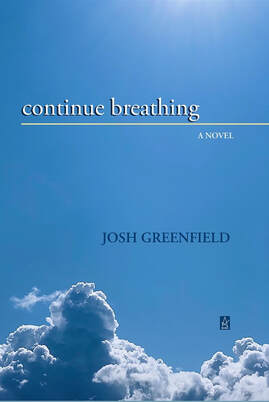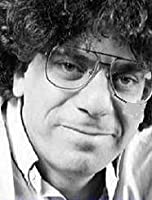
By Josh Greenfield
Genre: Fiction
Book Description
“Continue Breathing: A Novel” follows the adventures and misadventures of its protagonist, Jordan Fineman, as he seeks to fight his way out of the depths of an emotional breakdown. Jordan is diagnosed as both a manic-depressive, during the days when that term was still in use, and a severe obsessive-compulsive. Before he can find his place in the world as a writer, before he can know a relative amount of peace, he must go through his trials; two hospitalizations for mental illness, a psychotic episode, more than twenty-five years of psychotherapy and swimming pools full of psychiatric medications. In the end, it is a story of perseverance and victory, and of striving to live in the present day, made possible by one particularly skilled psychiatrist and his able successor. If Jordan begins his journey with one particular gift, it is his sense of humor. He is able to laugh at himself. This, in the end, is what brings him home.

Josh Greenfield is a graduate of both Phillips Andover Academy and Cornell University's College of Arts and Sciences. He holds two master’s degrees from the City University of New York, one in history and one in English literature. He also completed the better part of a doctorate in English at Fordham University. In his writing he attempt to address the recovery from mental illness with humor and honesty.
His work has been featured in The Cornell Daily Sun, The Riverdale Press, Appalachia, Word Catalyst Magazine, Better than Starbucks, Chaleur Magazine, The B’K Magazine, Prometheus Dreaming and Adelaide Literary Magazine. His story “And the Doors of the Ambulance Closed,” was nominated for a Best of the Net 2019 award. His novel “Continue Breathing,” was published by Adelaide Books in 2020.
Website: www.JoshGreenfield.us
Facebook: https://www.facebook.com/joshgreenfieldwriter
Amazon: https://www.amazon.com/dp/1954351291/ref=sr_1_1?dchild=1&keywords=Continue%20Breathing%20by%20Josh%20Greenfield&qid=1609414163&s=books&sr=1-1&fbclid=IwAR0l66zaPftnGyNtYwwUn2G3x2PvpBm_GW4bwCZYEVnErqWXHJMEva6RwtU
Goodreads: https://www.goodreads.com/book/show/56756845-continue-breathing?ac=1&from_search=true&qid=BuLjFs05f2&rank=1
EXCERPT:
The only way to look back at all this is with something resembling a smile. The breakdown happened when I was twenty-one years old. It was June of what should have been the end of my senior year. I’d finished three and spent one screwing around. I had a part-time job in a vegetarian restaurant. I was a waiter, though on some days I helped in the kitchen. It was communal in that way. I was staffing the dining room one Sunday morning, but there wasn’t a whole lot to do. The spinach had been washed, and the fruit juice bottles carefully arranged, all by people more functional than myself. The wooden interior was inviting, with the morning sun flooding in through the large picture window. In the kitchen, the corn was quietly sautéing in garlic sauce, and the brown rice was nicely puffed. All we needed were some customers.
A man and a woman entered to the sound of the tinkling bell above the door, not that we would have overlooked them in the rush. They took a seat at a table for two against the wall. The woman wore a long maroon skirt, and the man had his hair pulled loosely back in a ponytail. Ready to serve, I approached the table and offered the couple menus. I looked at them. The woman smiled, the man nodded. They consulted the bill of fare in silence.
I stepped back behind the wait station and began to contemplate the water glasses. Five filled, two empty glasses on the end.
I could fill them, or not…
If I fill them I’ll have to refill the pitcher, which means walking into the kitchen.
If I don’t fill them I’m going to run out of water glasses. Unless I fill them later…
It might get busy and I won’t have time. I could fill the glasses but let the water level in the pitcher drop. How much would it drop? If I got a smaller pitcher, it wouldn’t drop as much. At least it wouldn’t look like it had dropped as much.
No one is going to look at the pitcher.
I could take the empty glasses off the end of the shelf. Then at least I wouldn’t have to think about them. I could also put them under the counter.
There, now all the water glasses are filled. But three don’t have any ice. The empty glasses under the counter don’t have any ice either. They don’t even have any water.
What will people think when they see empty glasses under the counter? Nobody puts empty glasses under the counter.
Better put them back on the shelf...
There.
The couple had been ready for ten minutes. I walked over to take their order.
“I’ll have the soup and salad. With cornbread, right?” the woman asked.
I looked at her but did not fully comprehend the question. I nodded. I made some effort to write down her request. The writing was not coherent. These people had water. But the man had no ice, or very little. They needed ice.
“The choices?” she asked again, smiling a little more forcefully.
I tried to focus. “There’s blue cheese. There’s also Russian and… a French.” She ordered the French. I got something down on paper about the man’s order and retreated to the wait station. The ice glasses were still there. I counted them again: five filled, two empty. Of the five filled, three didn’t have any ice.
It’s getting warm outside. It’s going to get hot.
No ice. The ice is in the kitchen. I could fill the pitcher and get the ice at the same time. What would Corey think? Doesn’t everyone fill the glasses with water and ice before the meal, during set up? There are two glasses filled with ice. That’s enough for one more table of two. What if it’s a table for four? Two would get water with ice and two would get water without ice. Maybe they wouldn’t notice…Better get the ice now.
This process proceeds indefinitely, or until interrupted. Some prisons have no walls.
The order slip with the pencil scratch marks on it was crumpled and placed in the front left pocket of my denim apron. It remained there. The couple was quietly looking at one another across the table for two. The kitchen staff were leaning against the stove perusing the Sunday paper. Nothing was happening. Forty-five minutes went by in this condition of suspended animation.




 RSS Feed
RSS Feed
